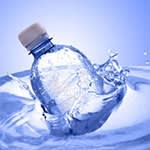 Invista, one of the world’s largest integrated polymers and fibers producers, has obtained regulatory clearance for OxyClear barrier resin for food and beverage packaging under the Federal Food, Drug, and Cosmetic Act and the European Union Packaging Directive for certain food types and processing conditions.
Invista, one of the world’s largest integrated polymers and fibers producers, has obtained regulatory clearance for OxyClear barrier resin for food and beverage packaging under the Federal Food, Drug, and Cosmetic Act and the European Union Packaging Directive for certain food types and processing conditions.Containers made from OxyClear barrier resin are crystal clear and protect oxygen-sensitive foods and beverages, such as juice, wine, beer, dairy and fortified water as well as ketchup, sauces and other condiments throughout their entire shelf life. Colorless and tinted containers made from OxyClear™ barrier resin show the same clarity as containers made from standard PET.
- Our customers repeatedly ask us for a clear, polyester-based oxygen ingress barrier resin to replace glass, multi-layer barrier and other containers for oxygen-sensitive food and beverages. Our answer is OxyClear barrier resin - said Chris Hamman, president of INVISTA Polymer and Resins.
Hamman when on to say, “OxyClear barrier resin provides the clarity and shelf life performance of glass packaging in a PET container. We expect that OxyClear barrier resin will change the way the packaging industry looks at protecting food and beverages from oxygen.”
OxyClear barrier resin is a 2-component barrier system in which up to 3% of OxyClear resin, an oxidizable co-polyester, is added at the injection machine to PolyShield resin, the reliable and long-time proven barrier resin used in beer packaging. The oxygen barrier is activated when OxyClear resin additive is added to the injection machine.
OxyClear resin additive is a high-capacity oxygen absorber that is polyester-based. Therefore, it contains no nylon or nitrogen that can contribute to yellowing during recycling. OxyClear barrier resin exhibits significantly reduced yellowing during the recycling process compared to other commercial oxygen scavengers. We are in the process of reviewing recognition guidelines from the Association of Postconsumer Plastic Recyclers (APR) and/or the European Plastic Bottle Platform (EPBP).


